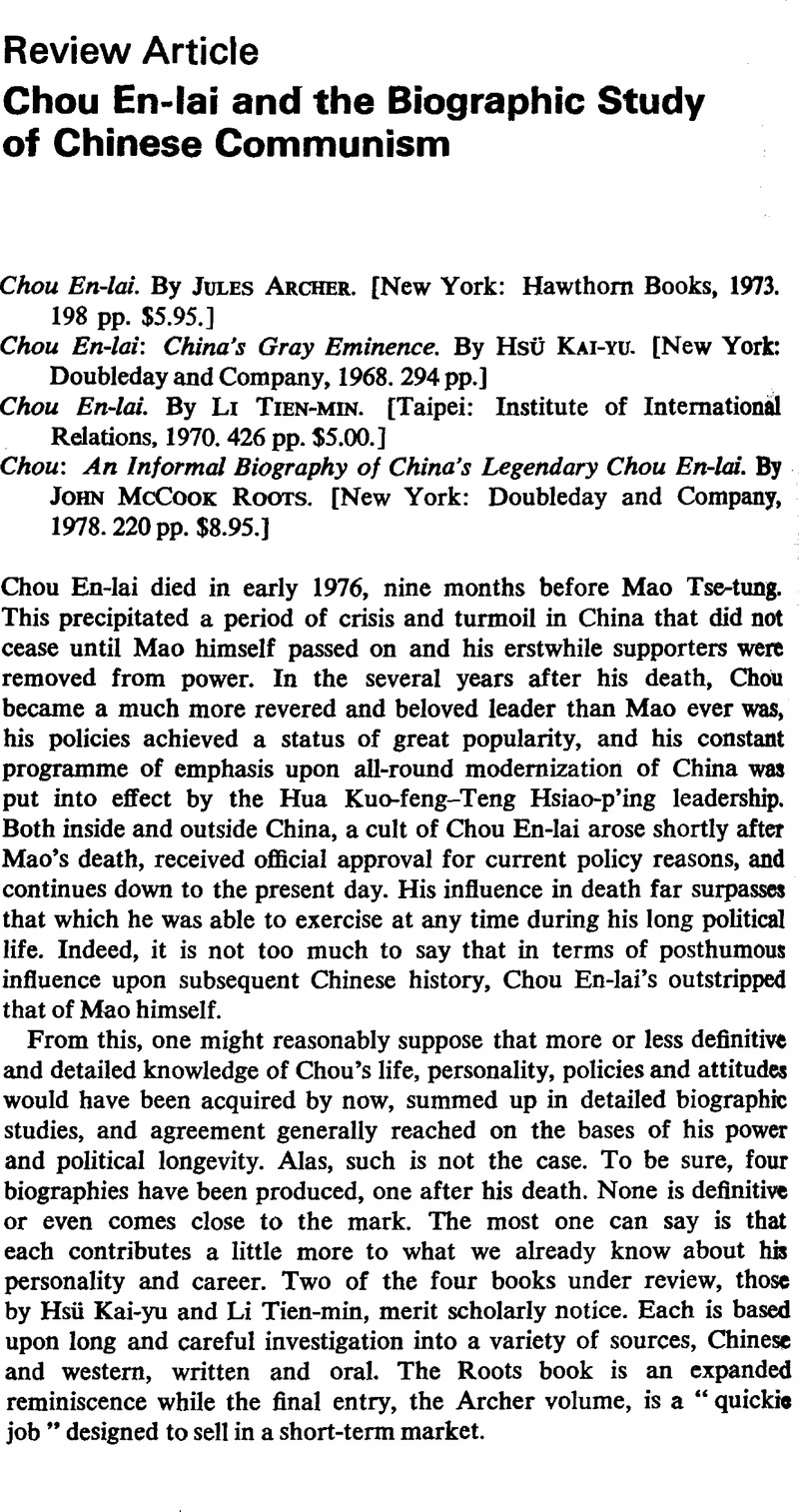No CrossRef data available.
Article contents
Chou En-lai and the Biographic Study of Chinese Communism
Published online by Cambridge University Press: 17 February 2009
Abstract

- Type
- Review Article
- Information
- Copyright
- Copyright © The China Quarterly 1979
References
1. Boorman, Howard Lyon and Howard, Richard Campbell (eds.), Biographical Dictionary of Republican China (New York: Columbia University Press, 1967)Google Scholar; and Klein, Donald W. and Clark, Anne B. (eds.), Biographic Dictionary of Chinese Communism, 1921–1965 (Cambridge: Harvard University Press, 1971)Google Scholar.
2. On Liu, see Dittmer, Lowell, Liu Shao-ch'i and the Chinese Communist Revolution: The Politics of Mass Criticism (Berkeley: University of California Press, 1974)Google Scholar.
3. Ch'en, Jerome, Mao and the Chinese Revolution (London: Oxford University Press, 1965)Google Scholar; Schram, Stuart, Mao Tse-tung (New York: Simon and Schuster, 1966)Google Scholar; and Solomon, Richard H., Mao's Revolution and the Chinese Political Culture (Berkeley: University of California Press, 1971)Google Scholar.
4. Erikson, Erik, Young Man Luther (New York: W. W. Norton and Co., 1958)Google Scholar; Erikson, Erik, Gandhi's Truth (New York: W. W. Norton and Co., 1969)Google Scholar; and Alexander, and George, Juliette, Woodrow Wilson and Colonel House: A Personality Study (New York: Dover, 1956)Google Scholar.
5. Pye, Lucian W., Mao Tse-tung: The Man in the Leader (New York: Basic Books, Inc., 1968)Google Scholar.
6. Sheridan, James E., Chinese Warlord: The Career of Feng Yu-hsiang (Stanford: Stanford University Press, 1966)Google Scholar; and Gillin, Donald G., Warlord: Yen Hsi-shan in Shansi Province 1911–1949 (Princeton: Princeton University Press, 1976)Google Scholar.
7. Barber, James David, The Presidential Character: Predicting Performance in the White House (New Jersey: Prentice Hall, 1977)Google Scholar; Burns, James M., Leadership (Evanston: Harper and Row, 1978)Google Scholar; Greenstein, Fred, Personality and Politics (New York: W. W. Norton and Co., 1975)Google Scholar; and Smith, M. Brewster, ”A map for the analysis of personality and politics,” Journal of Social Issues, Vol. 24, No. 3 (Autumn 1968), pp. 16–28CrossRefGoogle Scholar.
8. Kupper, Herbert, ”Some psychological hypotheses about Mao Tse-tung's personality,” Studies in Comparative Communism, Vol. 7, Nos. 1 and 2 (Spring/ Summer 1974), pp. 50–52CrossRefGoogle Scholar.
9. Spence, Jonathan D., Emperor of China: Self-Portrait of K'ang Hsi (New York: Alfred A. Knopf, 1974)Google Scholar.
10. Festiger, Leon, A Theory of Cognitive Dissonance (Evanston: Row, Peterson and Co., 1955)Google Scholar; Lifton, Robert Jay, Thought Reform and the Psychology of Totalism: A Study of Brainwashing in China (New York: W. W. Norton and Co., Inc., 1961)Google Scholar; and Schein, Edgar H. with Inge Schneier and Burker, Curtis H., Coercive Persuasion: A Sociopsychological Analysis of the “Brainwashing” of American Civilian Prisoners by the Chinese Communists (New York: W. W. Norton Co., Inc., 1971)Google Scholar.


